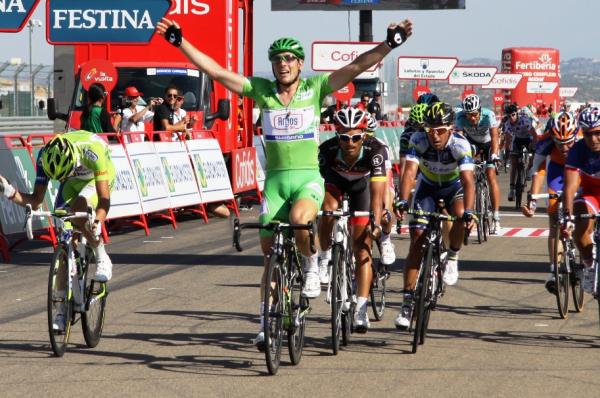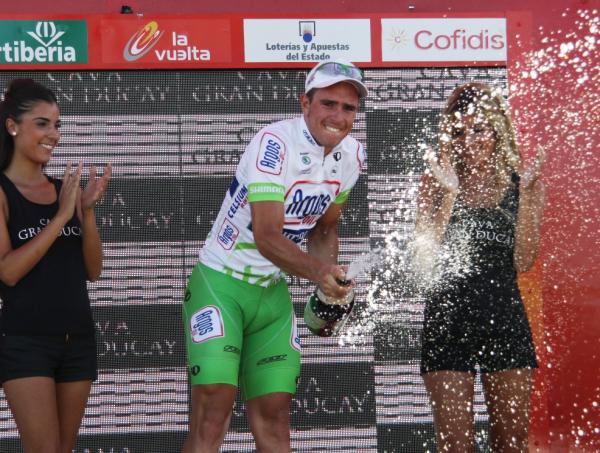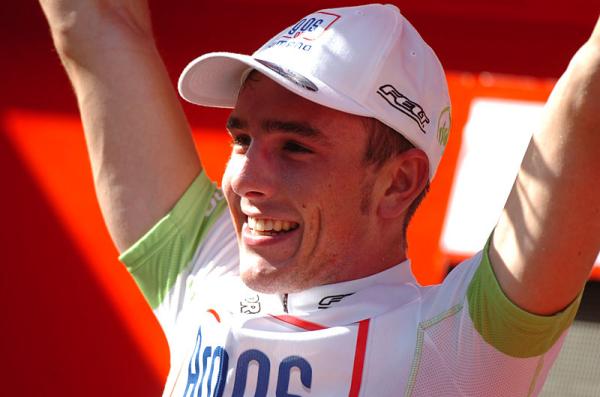Degenkolb wins third Vuelta a Espana stage
German's sprint record perfect so far in this year's Vuelta



In less than a week at the Vuelta a Espana, cycling history has repeated itself on three occasions: Allan Davis (Orica-GreenEdge) on stage 2, Daniele Bennati (RadioShack-Nissan) on stage 5, Elia Viviani (Liquigas-Cannondale) on stage 7 - all three of them have hammered their handlebars in frustration at finishing second behind John Degenkolb (Argos Shimano) as the German's powerful last ditch acceleration helped him roar past and net yet another late, but convincing, victory.
Degenkolb is not just hammering them in stage wins. The 23-year-old has built up a healthy lead in the points competition, with 76 points compared to closest purser Viviani, who has 47. Although all-rounder Bauke Mollema won the points competition in 2011, Mark Cavendish's final victory in that classification in 2010 and Andre Greipel's win in 2009 could give the German reasons for hoping he may take it all the way to Madrid.
"Last year, it went to Mollema, and he's a bit different than me," Degenkolb said, "but I've got the green jersey on my shoulders and of course I will fight for it. I fight for everything."
"It was a pretty hard stage finish -left, right, up, down - and everybody could see how difficult it was, we were all lined out. But Sky did a great job and a good leadout for Swifty [Ben Swift] and I had a few problems when they started to pull so hard."
"But finally my guys had timed things well, put me in perfect position, and I was there all the way."
"One victory was enough to make me happy. Everything else was a bonus. But getting so many and doing so well makes it much easier to suffer."
As Degenkolb also pointed out, three wins in a week makes it clear that as a ProConti team invited by the Vuelta organisation, "we deserve to be here. And we deserved to be in the Tour [de France] as well, where only Marcel [Kittel] getting sick made it tougher for us. But I want to thank the Vuelta organisation for inviting us."
The latest race content, interviews, features, reviews and expert buying guides, direct to your inbox!
Munching on a plate of rice and tomato both before and after the press conference, race leader Joaquím Rodriguez said it had been a "very stressful day. [It was] really hot again and finally that takes its toll. The guys who were going back to get water said they felt really envious of the air conditioning coming out of the team car windows."
Despite the temperatures yet again getting unpleasantly close to 40 degrees Celsius, it was not, however, the hottest weather the Katusha rider has experienced in a race. He remembered both the 2005 Vuelta and a Tour Down Under of around a decade ago as being even worse.
Rodriguez is keen, however, to get to grips with the Collada de la Gallina summit finish on tomorrow's stage into Andorra, close to where he has a home and trains for long periods and where a radical weather change is expected, too. Temperatures are due to drop by over 10 degrees, and there may well be rain during the stage.
"The Collada is a very tough climb, particularly the last four kilometres where there are sections of up to 15 or 20 percent. For sure Alberto [Contador-Saxo Bank] will try to attack."
"My three biggest rivals [Alejandro Valverde, Contador and Chris Froome] are totally different, and we'll have to see how they race there: Contador likes big changes of speed, Alejandro is more the kind of rider to take things easy right up until the last minute, and Froome is going to try and wear us down slowly."
Asked to compare how he felt compared to 2010, when he last led the Vuelta but lost it in Andorra, Rodriguez said, "It was a very different season. I had done a lot of racing back then before the Vuelta. This time around, I feel a lot more sure I can do well overall."
Tomorrow, his words will be put to the test.
Alasdair Fotheringham has been reporting on cycling since 1991. He has covered every Tour de France since 1992 bar one, as well as numerous other bike races of all shapes and sizes, ranging from the Olympic Games in 2008 to the now sadly defunct Subida a Urkiola hill climb in Spain. As well as working for Cyclingnews, he has also written for The Independent, The Guardian, ProCycling, The Express and Reuters.
